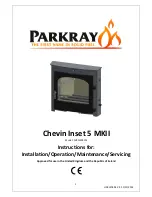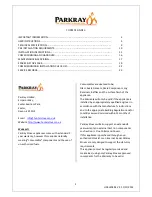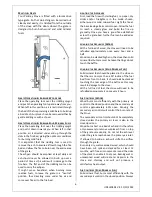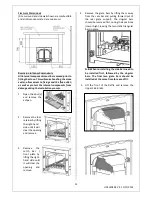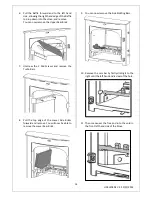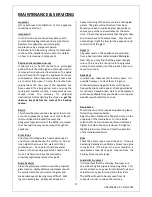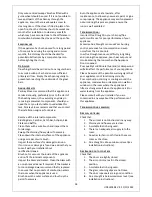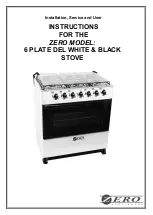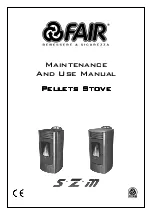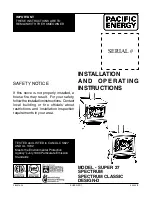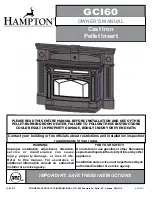
6
JINCHI05 REV E. 11/11/2014
M
ULTIFUEL
G
RATE
Your Parkray Stove is fitted with a locomotive
type grate. So that de-ashing can be carried out
cleanly and easily, it is riddled from the outside
of the stove with the doors closed. The grate is
designed to burn both wood and solid mineral
fuels.
G
RATE
O
PERATION
&
B
URNING
W
OOD
L
OGS
Place the operating tool over the riddling spigot
and push the operating tool up and away from you.
When left in this position, air is restricted through
the bed of the fire providing a solid base to build up
a bed of ash. Surplus ash can be removed either by
gentle riddling or with a shovel.
G
RATE
O
PERATION
&
B
URNING
S
OLID
M
INERAL
F
UELS
Place the operating tool over the riddling spigot
and pull it down towards you. When left in that
position, air is directed under and up through the
slots in the fire bed, giving the optimum conditions
for burning solid fuels.
It is important that the riddling tool is used to
remove the ash to ensure airflow through the fire
bed and allow the fire to burn over the entire area
of the grate.
The ashpan should be emptied at least daily and
ash should never be allowed to build up over a
period of time as this will result in damage to the
fire bars. The flat end of the riddling tool can be
used to carry the ashpan.
It might prove beneficial, when burning more
reactive fuels, to leave the grate in a “neutral”
position, thus directing some under fire air and
some over fire air to the fire bed.
L
IGHTING THE
A
PPLIANCE
First, load the fire with starting fuel, i.e. paper, dry
sticks and/or firelighters in the mode chosen,
either wood or solid mineral fuel. Light the fire at
the base leaving all air controls open. Allow the fuel
to reach a steady glow and build the fire up
gradually. Once you have a good fire established
across the grate bed, further fuel can be added as
required.
L
OADING THE
A
PPLIANCE
(W
OOD
)
With a full load of wood, the stove will need to be
refuelled approximately once every hour and a
half.
Wood can be stacked higher in the stove than solid
mineral fuel but care must be taken that logs do not
touch the baffle.
L
OADING THE
A
PPLIANCE
(S
OLID
M
INERAL
F
UEL
)
Solid mineral fuel should be placed in the stove so
that there is no more than a 30° incline of the fuel
bed from front to back. It should
not
be stacked
touching the rear edge of the baffle as this may
result in damage to the stove.
With a full load of fuel, the stove will need to be
refuelled approximately once every 4 hours
A
IR
C
ONTROLS
(W
OOD
)
Wood burns most efficiently with the primary air
control in the closed position and the secondary air
control approximately 60% open. Moving the
secondary air control will control the burn rate of
the Stove.
The secondary air control should not be completely
closed unless the primary air lever is also in the
closed position.
Wood burns best on a bed of ash and it is therefore
only necessary to remove surplus ash from on top
of the grate occasionally. Do not let the ash level
under the grate reach above the primary air inlet.
If allowed to build-up, ash will stifle the airflow
through the grate.
Burn only dry, well-seasoned wood, which should
have been cut, split and stacked for at least 12
months, with free air movement around the sides
of the stack to enable it to dry out. Burning wet or
unseasoned wood will create tar deposits in the
stove and chimney and will not produce a
satisfactory heat output.
A
IR
C
ONTROLS
(S
OLID
M
INERAL
F
UEL
)
Solid mineral fuel burns most efficiently with the
secondary air control in the closed position. Always
Summary of Contents for Chevin Inset 5 MKII
Page 24: ...24 JINCHI05 REV E 11 11 2014 ...

